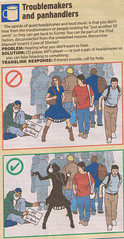 Image by sillygwailo via Flickr
Image by sillygwailo via Flickr
I pulled this out of Romanesko and sent it to Ricardo and Big Pat:
"There are only two ways to stop the newspaper death spiral"
Calbuzz
Phil Trounstine and Jerry Roberts write:
* Newspapers have to concentrate all of their force and fire power on their own communities, making themselves indispensable to local residents.
* Or, a business like Google or Yahoo can begin to pay reporters in communities to produce content -- to cover city councils and school boards, write about local development and utilities, local sports and arts, etc.
Posted at 10:15 AM Apr. 2, 2009
Ricardo responded:
Thanks for the link. I agree with the general drift of local focus and internet deals as promising tunnel end of light.
Somehow, against the odds, the swell of letters to the Chron editor on this topic, silly often though not always, and particularly those commenting on facets of a non-profit reorg approach (with well-compensated newspaper pros) gives me an odd hope.
I'd ignore those letters if they didn't fit so closely with reporting on Gavin Newsome and rich guys talking out loud about this same thing. So, put me down in the unlikely optimist column, regarding the Chron only, with little hope for big city papers elsewhere.
And then Big Pat said:
The problem I see with this is that “all force and power on their own communities” will likely shake out to, “all force and power to wealthy communities”. Who will cover the local ghetto, West Fuck, Shasta county, or Weed,
And so then *I* said.
Yah, Pat is right – newspapers are owned by the pillars of the community and all flows from that. Indeed, the heretical question is what fraction of what is in a newspaper appeals to what fraction of those voters and activists who move events one way or another achieving some substantive change of how things change, politically or otherwise. We say newspapers matter, as I naturally would since my self-image and my reason for being is intimately connected with the notion that they do/did matter. (And I was a feature writer for god’s sake.)
Maybe what comes after will accomplish whatever good things newspapers have accomplished – but with less preening, less self-important huffing and puffing? It’s not a rhetorical question mark.
![Reblog this post [with Zemanta]](http://img.zemanta.com/reblog_e.png?x-id=fa546c8a-0bdf-4259-9206-29fbdbe8df6b)




No comments:
Post a Comment